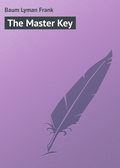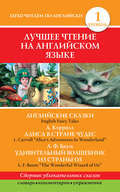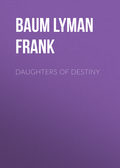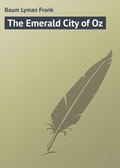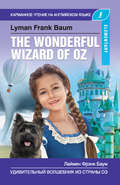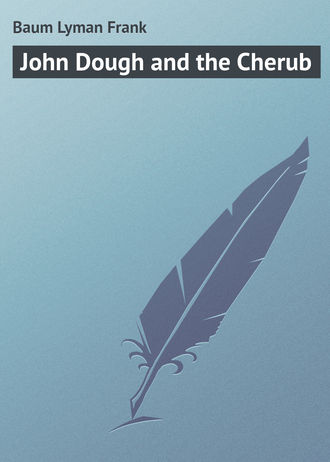
Лаймен Фрэнк Баум
John Dough and the Cherub
John Dough Begins his Adventures
Now, when John Dough left Madame Grogrande's shop and wandered up the street, he was reeking with the delightful odor of fresh gingerbread. Indeed, he was still so hot from the oven that I am positive you could not have held your hand against him for more than a second. The Great Elixir had brought him to life, and given him a certain standing in the world; but during the first half-hour of his existence John Dough was very hot-headed. Also he was hot-footed, for he discovered that, by walking fast, the contact with the fresh morning air drew the heat from his body and made him feel much more comfortable.
One virtue lent by the Great Elixir was knowledge, and while John Dough felt that he possessed unlimited knowledge (having had an overdose of the Elixir), he could not very well apply it to his surroundings because he lacked experience with the world, which alone renders knowledge of any value to mankind. John Dough could speak all languages – modern and classic. He had a logical and clear mind – what is called a "level head," you know; and this was coupled with good sense, fair judgment, and a tangled mass of wisdom that had been dumped into him in a haphazard fashion. But these rare qualities were as yet of no use to our man because he had acquired no experience. It was like putting tools into a scholar's hands and asking him to make a watch. John Dough might accomplish wonders in time, if he did not grow stale and crumble; but just now he was the freshest individual that ever came out of a bake-room.
It was still early morning, and most folks were in bed. A prowling dog smelled the gingerbread and came trotting up with the intention of having a bite of it; but John Dough raised his candy cane and hit the dog a clip on the end of its nose that sent the animal in another direction with its tail between its legs. Then, whistling merrily, the gingerbread man walked on. He knew no tune whatever, but he could whistle, and so he managed to express an erratic mixture of notes that would have made Herr Wagner very proud.
His flesh (or bread, rather) was cooling off beautifully now. He was growing hard and crisp and felt much more substantial than at first. The baker had made him light and the Elixir had made him strong and vigorous. A great future lay before John Dough, if no accident happened to him.
Presently some one said, "Hello!" John stopped short, for in front of him stood a bright-eyed boy with a piece of lighted punk in one hand and a bunch of firecrackers in the other. It was Ned Robbins, who had been up since daybreak celebrating the Glorious Fourth.
"You skeered me at first," said the boy, with a look of amazement that he tried to cover with a laugh.
"I beg your pardon, I'm sure," returned John Dough, politely.
"Been to a masquerade?" asked Ned, staring hard at the gingerbread man.
"No, indeed," replied the other. "I am not disguised, I assure you. You see me as I am."
"G'wan!" exclaimed Ned. But he could smell the gingerbread, and he began to grow frightened. So he touched the punk to the fuse of his biggest firecracker, dropped it on the ground at the feet of John Dough, and then turned and scampered up an alley as fast as he could go.
The gingerbread man stood still and looked after Ned until the cracker suddenly exploded with a bang that caused John's candy teeth to chatter. His whole body was terribly jarred and he nearly fell backward in the shock of surprise. Then he, also, started to run. It was not fear, so much as ignorance of what might happen next, that caused him to fly from the spot; but he ran with a speed that was simply wonderful, considering that his limbs were of gingerbread. Truly, that Arabian Elixir was a marvelous thing!
Bang! He had run plump into another group of boys, knocking two of them over before they could get out of his way. His silk hat was jammed over his eyes and the candy cane struck the wheel of a toy cannon and broke off a good two inches from its end.
As he pulled off his hat he heard a shout and saw the boys all scrambling for the broken end of the candy cane. One of them grabbed it and ran away, and the others followed in a mad chase and were soon out of sight.
John Dough looked after them wonderingly. Then he drew himself up, pulled down his fine vest, sighed at discovering a slight crack in his shirt-front, and walked slowly along the street again. His first experience of life was not altogether pleasant.
"Good gracious!" said a voice.
He paused, and saw a woman leaning over a gate beside him and glaring at him in mingled surprise and terror. She held a broom in her hand, for she had been sweeping the walk. John lifted his hat politely.
"Good morning, madam," said he.
"Why, it's really alive!" gasped the woman.
"Is a live person so very unusual?" asked John, curiously.
"Surely, when he's made of cake!" answered the woman, still staring as if she could not believe her eyes.
"Pardon me; I am not cake, but gingerbread," he answered, in a rather dignified way.
"It's all the same," she answered. "You haven't any right to be alive. There's no excuse for it."
"But how can I help it?" he asked, somewhat puzzled by this remark.
"Oh, I don't suppose it's your fault. But it isn't right, you know. Who made you?"
"Jules Grogrande, the baker," he said, for he had read the name over the door.
"I always knew there was something wrong with those Frenchies," she declared. "Are you done?"
Before he could reply she had drawn a large straw from the broom and stuck it several inches into his side.
"Don't do that!" he cried, indignantly, as she drew out the bit of broom again.
"I was only tryin' you," she remarked. "You're done to a turn, and ought to make good eating while you're fresh."
John gazed at her in horror.
"Good eating!" he cried; "woman, would you murder me?"
"I can't say it would be exactly murder," she replied, looking at him hungrily.
"To destroy life is murder?" he said, sternly.
"But to destroy gingerbread isn't," she rejoined. "And I can't see that it's cannibalism to eat a man if he happens to be cake, and fresh baked. And that frosting looks good. Come inside while I get a knife."
She opened the gate and tried to grab John Dough by an arm. But he gave a sudden backward leap and then sped down the street at a furious run, looking neither to right nor left in his eager flight.
Luckily, he was not in the center of the town, but near the outskirts, and the houses were few and scattered.
By and by he saw a deserted barn near the roadside. The door was half open and sagged on its hinges, so it could not be closed.
John darted into the barn and hid behind some hay in the far side. He was thoroughly frightened, and believed he must avoid mingling with the people of the town if he would escape instant destruction.
A knife! A knife! The word kept ringing in his ears and filled him with horror. A knife could slice him into pieces easily. He imagined himself sliced and lying on a plate ready for hungry folks to eat, and the picture made him groan aloud.
All through the day he kept securely hidden behind the hay. Toward evening he decided to revisit the bakery. It was a difficult task, for he had passed through many streets and lanes without noticing where he was going, and it grew darker every minute. But at last, just as he was beginning to despair, he saw a dim light in a window and read over the door the sign: "Jules Grogrande, Baker."
He opened the door so softly that the little bell scarcely tinkled. But no one would have heard it had it rung loudly, for there was a confused murmur of fierce voices coming from the little room Madame usually occupied.
John Dough skipped behind the counter, where he could see into the room without being seen himself.
Around the little table stood the Arab, Monsieur Jules, and Madame, and they were all staring angrily into each other's faces.
"But the flask!" cried Ali Dubh. "Where is my precious flask?"
"It is here," said Madame, reaching behind the mirror and drawing forth something that glittered in the lamplight.
"But this is the silver flask – the cure for rheumatism," exclaimed the Arab. "Where my Golden Flask – containing the priceless Elixir of Life?"
"I must have made a mistake," said Madame, honestly; "for my eyes are so queer that I cannot tell gold from silver. Anyway, the contents of the other flask I emptied into a bowl of water, and rubbed my limbs with it."
The Arab shouted a despairing cry in his native tongue and then glared wildly at the woman.
"Was it the brown bowl, Leontine?" asked Monsieur Jules, trembling with excitement.
"Yes," she answered.
"Where is it? Where is it?" demanded the Arab, in a hoarse voice. "The precious liquor may yet be saved."
"Too late, Monsieur," said the baker, shaking his head, sadly. "I used the contents of the bowl to mix the dough for my gingerbread man."
"A gingerbread man! What do you mean?" asked Ali Dubh.
"I baked a man out of gingerbread this morning," said Monsieur Jules, "and to my horror he came alive, and spoke to me, and walked out of the shop while he was still smoking hot."
"It is no wonder," said the Arab, dolefully; "for within him was enough of the Great Elixir to bring a dozen men to life, and give them strength and energy for many years. Ah, Monsieur and Madame, think of what your stupidity has cost the world!"
"I do not comprehend," said Madame, firmly, "how the world has ever yet been benefited by the Great Elixir, which you and your selfish countrymen have kept for centuries corked up in a golden flask."
"Bismillah!" shouted the Arab, striking himself fiercely across the forehead with his clinched fist. "Cannot you understand, you stupid one, that it was mine —mine!– this Wonderful Water of Life? I had planned to use it myself – drop by drop – that I might live forever."
"I'm sorry," said Monsieur; "but it is your own fault. You forced my wife to care for the flask, and you would not let her tell me about it. So, through your own stupidity, I used it in the gingerbread man."
"Ah!" said Ali Dubh, an eager gleam in his eyes, "where, then, is that same gingerbread man? If I can find him, and eat him, a bit at a time, I shall get the benefit of the Great Elixir after all! It would not be so powerful, perhaps, as in its natural state; but it would enable me to live for many, many years!"
John Dough heard this speech with a thrill of horror. Also he now began to understand how he happened to be alive.
"I do not know where the gingerbread man is," said Monsieur. "He walked out of my shop while he was quite hot."
"But he can be found," said the Arab. "It is impossible for a gingerbread man, who is alive, to escape notice. Come, let us search for him at once! I must find him and eat him."
He fairly dragged Monsieur and Madame from the room in his desperation, and John Dough crouched out of sight behind the counter until he heard them pass through the door and their footsteps die away up the street.
The talk he had overheard made the gingerbread man very sad indeed. The bakery was no safe home for him, after all. Evidently it was the Arab's intention to find him and insist upon eating him; and John Dough did not want to be eaten at all.
Therefore his enemies must not find him. They were no safer to meet with than the awful woman who wanted to cut him into slices; and he was learning, by degrees, that all men were dangerous enemies to him, although he had himself the form of a man.
He left the bakery and stole out into the street once more, walking now in the opposite direction from that taken by the Arab and the Grograndes.
As he hurried along he met with few people on the streets; and these, in the dark, paid little attention to the gingerbread man; so gradually his spirits rose and his confidence in his future returned.
By and by he heard a strange popping and hissing coming from the direction of the square in the center of the town, and then he saw red and green lights illuminating the houses, and fiery comets go sailing into the sky to break into dozens of beautiful colored stars.
The people were having their Fourth of July fireworks, and John Dough became curious to witness the display from near by. So, forgetting his fears, he ran through the streets until he came to a big crowd of people, who were too busy watching the fireworks to notice that a gingerbread man stood beside them.
John Dough pressed forward until he was quite in the front row, and just behind the men who were firing the rockets.
For a time he watched the rush of the colored fires with much pleasure, and thoroughly enjoyed the sputtering of a big wheel that refused to go around, merely sending out weak and listless spurts of green and red sparks, as is the manner of such wheels.
But now the event of the evening was to occur. Two men brought out an enormous rocket, fully fifteen feet tall and filled with a tremendous charge of powder. This they leaned against a wooden trough that stood upright; but the rocket was too tall to stay in place, and swayed from side to side awkwardly.
"Here! Hold that stick!" cried one of the men, and John Dough stepped forward and grasped the stick of the big rocket firmly, not knowing there was any danger in doing so.
Then the man ran to get a piece of rope to tie the rocket in place; but the other man, being excited and thinking the rocket was ready to fire, touched off the fuse without noticing that John Dough was clinging fast to the stick.
There was a sudden shriek, a rush of fire, and then – slowly at first, but with ever-increasing speed – the huge rocket mounted far into the sky, carrying with it the form of the gingerbread man!
Chick, the Cherub
The rocket continued to send out fiery sparks of burning powder as it plunged higher and higher into the black vault of the heavens; but few of these came in contact with John Dough, who clung to the far side of the stick and so escaped being seriously damaged. Also the rocket curved, and presently sped miles away over land and sea, impelled by the terrible force of the powder it contained. John fully expected that it would burst presently, and blow him to bits amid a cloud of colored stars. But the giant rocket was not made in the same way as the other and smaller ones that had been fired, the intention being merely to make it go as high and as far as possible. So it finally burned itself out; but so great was the speed it had attained that it continued to fly for many minutes after the last spark had died away.
Then the rocket began to take a downward course; but it was so high up, by that time, that the stick and the empty shell flew onward hour after hour, gradually nearing the ground, until finally, just as a new day began to break, the huge stick, with John Dough still holding fast to its end, fell lightly upon an island washed on all sides by the waves of a mighty sea.
John fell on a soft bush, and thence bounded to the ground, where for a time he lay quite still and tried to recover his thoughts.
He had not done much thinking, it seems, while he was in the air. The rush of wind past his ears had dazed him, and he only realized he must cling fast to the stick and await what might happen. Indeed, that was the only thing to be done in such an emergency.
The shock of the fall had for a moment dazed the gingerbread man; and as he lay upon the ground he heard a voice cry:
"Get off from me! Will you? Get off, I say."
John rolled over and sat up, and then another person – a little man with a large head – also sat up and faced him.
"What do you mean by it?" asked the little man, glaring upon John Dough angrily. "Can't you see where you're falling?"
"No," answered John.
It was growing lighter every minute, and the gray mists of morning were fading away before the rising sun. John looked around him and saw he was upon a broad, sandy beach which the waves of a great sea lapped peacefully. Behind was a green meadow, and then mountains that rose high into the air.
"How did you happen to be where I fell?" he asked, turning to the little man again.
"I always sleep on the sands," replied the other, wagging his head solemnly. "It's my fad. Fresh air, you know. I'm called the 'Fresh-Air Fiend.' I suppose you're a new inhabitant. You seem rather queer."
"I'm made of gingerbread," said John.
"Well, that certainly is unusual, so I've no doubt you will be warmly welcomed in our Island," replied the man.
"But where am I?" asked John, looking around again with a puzzled expression.
"This is the Isle of Phreex," answered the other, "and it is inhabited by unusual people. I'm one, and you're another."
He made such a droll face as he said this that the gingerbread man could not resist smiling, but it startled him to hear another laugh at his back – a sound merry and sweet, such as a bird trills. He swung around quickly and saw a child standing upon the sands, where the rays of the sun fell brightly upon its little form. And then the glass eyes of the gingerbread man grew big, and stood out from his cake face in a way that fully expressed his astonishment.
"It's a Vision!" he exclaimed.
"No, it's the Cherub – whom we call Chick," answered the big-headed man, carelessly.
The child had fair hair, falling in fleecy waves to its shoulders, but more or less tangled and neglected. It had delicate features, rosy cheeks, and round blue eyes. When these eyes were grave – which was seldom – there were questions in them; when they smiled – which was often – sunbeams rippled over their blue surfaces. For clothing the child wore garments of pure white, which reached from the neck to the ankles, and had wide flowing sleeves and legs, like those of a youngster's pajamas. The little one's head and feet were bare, but the pink soles were protected by sandals fastened with straps across the toes and ankles.
"Good morning," said John, again smiling and hoping he had not stared too rudely. "It gives me great pleasure to meet you."
"My name's Chick," replied the child, laughing in sweet trills, while the blue eyes regarded the gingerbread man with evident wonder.
"That's a funny name," said John.
"Yes, it is funny," the child agreed, with a friendly nod. "Chick means a chicken, you know. But I'm not a chicken."
"Of course not," returned John. "A chicken is covered with feathers. And you are not."
At this Chick laughed merrily, and said, as if it were the simplest thing in the world: "I'm the Incubator Baby, you know."
"Dear me, I hadn't the least idea of it," John answered gravely. "May I ask what an Incubator Baby is?"
The child squatted down in the sand, hugged its chubby knees, and uttered peal after peal of joyous laughter.
"How funny!" it gurgled; "how funny that you don't know what the Incubator Baby is! Really, you must be fresh-baked!"
"I am," said John, feeling rather ashamed to acknowledge the fact, but resolving to be truthful.
"Then, of course, you are very ignorant," remarked the Fresh-Air Fiend, rubbing his big head complacently.
"Oh, as for that," said John, "I acquired, in course of manufacture, a vast deal of ancient learning, which I got from an Arabian Elixir with which the baker mixed me. I am well posted in all events down to the last century, but I cannot recall any knowledge of an Incubator Baby."
"No, they're a recent invention," declared the big-headed man, patting tenderly the child's golden curls. "Were you, by any chance, at the Pan-American Exposition? Or the Louisiana Purchase Exposition?"
"No," answered John. "My knowledge was corked up about then."
"Well," continued the man, "there were a good many Incubator Babies at both those expositions, and lots of people saw them. But Chick is the first and only Original Incubator Baby, and so Chick properly belongs in the Isle of Phreex."
Chick jumped up, made a stiff bow, and with eyes sparkling with mischief exclaimed: "I'm six years old and quite strong and well."
"Tut-tut, Chick!" remonstrated the big-headed man; "it was more than two years ago you were taught to make that speech. You can't be always six years old, you know."
The little sprite enjoyed the joke so much that John was forced to laugh in sympathy. But just then a thought struck him, and he asked, a little nervously:
"Do you like gingerbread?"
"I don't know," replied Chick. "Are you gingerbread?"
"I am," said John, bravely.
"Then I like gingerbread," the child declared; "for you smell sweet and look kind and gentle."
John didn't know whether to accept this as a compliment or not. He was sorry to learn that he smelled sweet, although to be called kind and gentle was grateful praise.
"Some folks," he remarked, timidly, "have an idea they like to eat gingerbread."
"I couldn't eat you," the child said, seriously, "because, being the Incubator Baby, I have to be very careful of my diet. You might not agree with me."
"I'm sure I couldn't agree with any one who ate me," John declared. "For, although as yet I have had no experience of that sort, it seems to me a very undesirable fate."
"Very true," remarked the big-headed man.
"Let's be friends!" exclaimed Chick, coming close to John and taking his soft brown hand in a firm clasp. "I'll take care of you."
John looked down at the merry little elf in positive wonder.
"We'll be friends, all right," said he; "but instead of your taking care of me, Chick, I'll take care of you."
"Oh, there you are entirely wrong," broke in the big-headed man. "Chick's a privileged character in the Isle of Phreex, and the only one of us who dares defy our awful kinglet. And in case of danger – "
"Danger!" cried John, with a start. "Is there danger here, too?"
Chick's laughter rang out at the foolish question, but the man replied seriously:
"There is danger everywhere, to those who are unusual, and especially in the Isle of Phreex, where we are at the mercy of a horrid kinglet. But come; we must go and report your arrival to that same graceless ruler, or we shall all be punished."
"Very well," said John, meekly.
But as he took Chick's hand and turned to depart the Fresh-Air Fiend uttered an exclamation of annoyance, and said:
"Here's bad luck already! The Failings are coming this way."
As he spoke a noise of shouting and chattering reached their ears, and presently several people came around a corner of rock and stood before John and his newly found friends.
"It's the Brotherhood of Failings," whispered the big-headed man. "Look out for them, or they'll do you a mischief."
"Don't worry; I'll take care of you," said Chick, pressing the dough hand.
John stared at the new-comers, and they returned the compliment by staring at him. A queerer lot of folks could seldom have been seen together.
"This is the Blunderer," said the Fresh-Air Fiend, indicating a short, fat man who was clothed in glittering armor and bore a lance over his shoulder. The Blunderer acknowledged the introduction by bowing. "And here is the Thoughtless One," continued the man, pointing to a tall, lean man who was clothed in chamois-leather and carried a wide-mouthed blunderbuss under his arm.
"Look out for the gun," said Chick; "he never knows whether or not it is loaded."
"And here are the Disagreeable, and the Unlucky, and the Sorrowful, and the Ugly, and the Awkward," continued the big-headed man, pointing out each Failing in turn. "Their peculiarities you will have no trouble to discover. Indeed, on all the Isle of Phreex, there is no one more unpleasant to meet with than this same lot of Failings."
At this the Brothers all bowed, saying at the same time:
"We are proud of ourselves!"
At that instant the Awkward tripped over his own toes and fell against the Blunderer, who tumbled headlong and thrust his slim lance straight through the body of John Dough.
"Oh!" cried Chick, greatly horrified.
"I told you so!" growled the Fresh-Air Fiend, pulling out the lance hastily. "Tell me, John Dough, are you dead, or are you just dying?"
"Neither one," said John, ruefully pushing together the hole that the lance had made; "but it doesn't add to my personal appearance to be prodded in that fashion. I'm made of gingerbread," he explained, turning to the man in armor.
"I beg your pardon! I really beg your pardon!" said the Blunderer, greatly distressed at what he had done. "I had no intention of hurting you."
"He means well," said the Incubator Baby; "but that doesn't help much."
"He won't last long in this Island," grunted the Bad-Tempered, referring to John Dough.
"Being made of gingerbread, he can't be expected to last," remarked the Disagreeable, smiling in a way that made John shudder.
"He shall have my protection," said the Blunderer. "It's the least I can do to make amends. Here – put on this armour!"
He hastily began stripping off the plates of metal, and placed the steel helmet over the head of the gingerbread man.
"No, no!" exclaimed John. "I don't want to wear all that hardware."
"But you must!" cried the Blunderer. "It's the only way you can escape accident in this awful Island."
"That's true enough," agreed the big-headed man. "I advise you to wear the armor, my gingerbread friend."
So John submitted to being dressed in the armor, and no sooner had the plates been strapped upon him than the wisdom of the act was apparent. For there came a rush and whirl of sound, and suddenly a great monster swept over the sands at the very spot where they stood. It sent the Brotherhood of Failings sprawling in every direction, while the Incubator Baby flew to the water's edge, and John Dough's armor-clad body was knocked down and pressed into the soft sand until it was level with the surface.
But presently Chick came back and made the others dig him out and set him upon his feet again, and then it was seen that no one had been seriously injured.
"What was it?" asked John, gazing in amazement at the place where the monster had disappeared in the distance.
"It's the one-wheeled automobile," answered the Sorrowful, "and unless it gets smashed mighty soon the Isle of Phreex will be an Isle of Cripples. I don't understand why they license the thing."
"Why, to make room for new arrivals, of course," declared the Disagreeable. "But it was lucky for the Pudding Man that he happened to be dressed in steel."
"I am not pudding, if you please," said John, indignantly. "I beg you to remember that I am gingerbread."
"It's all one," remarked the Thoughtless, "your cake is dough, anyhow."
"Let us return to the castle," the Ugly said. "Our kinglet should be introduced to his new subject."
So they all started off across the green, Chick leading the gingerbread man, until they came to a path leading upward through the rocks, along which they began to ascend. John had much difficulty in keeping out of the way of the Awkward, who tripped and stumbled constantly, while the Blunderer insisted upon taking the wrong path, and the Bad-Tempered stopped twice to fight with the Disagreeable and the Thoughtless. At last, however, they reached the top, which proved to be a broad plain of rock, upon which stood a great castle with many tall spires and grim towers and glittering minarets.
While they paused for John Dough to admire the view, and that they all might get breath, a sharp voice said near them:
"You're late, you lot of Failings, and the kinglet will scold."
John looked around, and saw perched upon a point of rock beside the path a most curious looking creature.
"Don't stare!" it said, with a laugh. "I don't, and I've got a dozen eyes to your one. Let me introduce myself. I'm the Prize Potato from the Centerville Fair."
Indeed, John now noticed a big blue ribbon twined around the middle of the potato, and on the ribbon was printed in gold letters: "First Prize."
"Some day you'll sprout," said the Disagreeable, "and then you won't have so many eyes."
The Prize Potato winked its numerous eyes, one after the other, in a droll fashion, and answered:
"Some day you'll meet with an accident, my dear Failing; but when you're planted in the ground you'll not sprout at all. That's where I'm your superior, for I'm perpetual. Every one of my eyes is good for a half-peck of potatoes, at least."
"Unless you're boiled with your jacket on," remarked the Ugly, with a sour smile.
"Come, come! Let us on," interrupted the little man with the big head. "Our kinglet doubtless awaits us."
When they had gone a few steps farther the Incubator Baby paused to say: "Some one is following us, and it's a stranger."
This remark caused John to look around, and immediately he stopped short with an expression of horror upon his frosted face. For there, turning the corner of the rocky path, was Ali Dubh the Arab. The fellow at once uttered a yell of joy and triumph, and drawing his gleaming knife he rushed upon John Dough with great eagerness.
The gingerbread man had given up all hope of escape and stood tremblingly awaiting his foe when, Chick suddenly grasped the Blunderer's lance and tripped the Arab so neatly with it that Ali Dubh fell his full length upon the path and broke his knife-blade into a dozen pieces. But he squirmed forward and was about to bite into John's leg when the big-headed man came to the rescue and threw a handful of pebbles into the Arab's open mouth, and so prevented him from doing the gingerbread man any damage.
"He seems dangerous," remarked the Blunderer. "Let's tie him up, before he hurts someone."
So while the Arab was coughing the pebbles out of his mouth, the Brotherhood of Failings bound his hands and feet with strong cords, so that he could not move.
"He's mine!" shouted the Arab, as soon as he could speak. "He belongs to me. I claim him for my own."
"There's no harm in that," replied the Fresh-Air Fiend. "But one of the laws of this Isle is that no person shall be injured by any one except the kinglet. And every one here must obey the laws. So, unless you promise not to carve or to eat this man of gingerbread, who is now a subject of our kinglet, we must lock you up in prison."
"I'll eat him as soon as I have the chance. I have a right to do so," cried the Arab.



